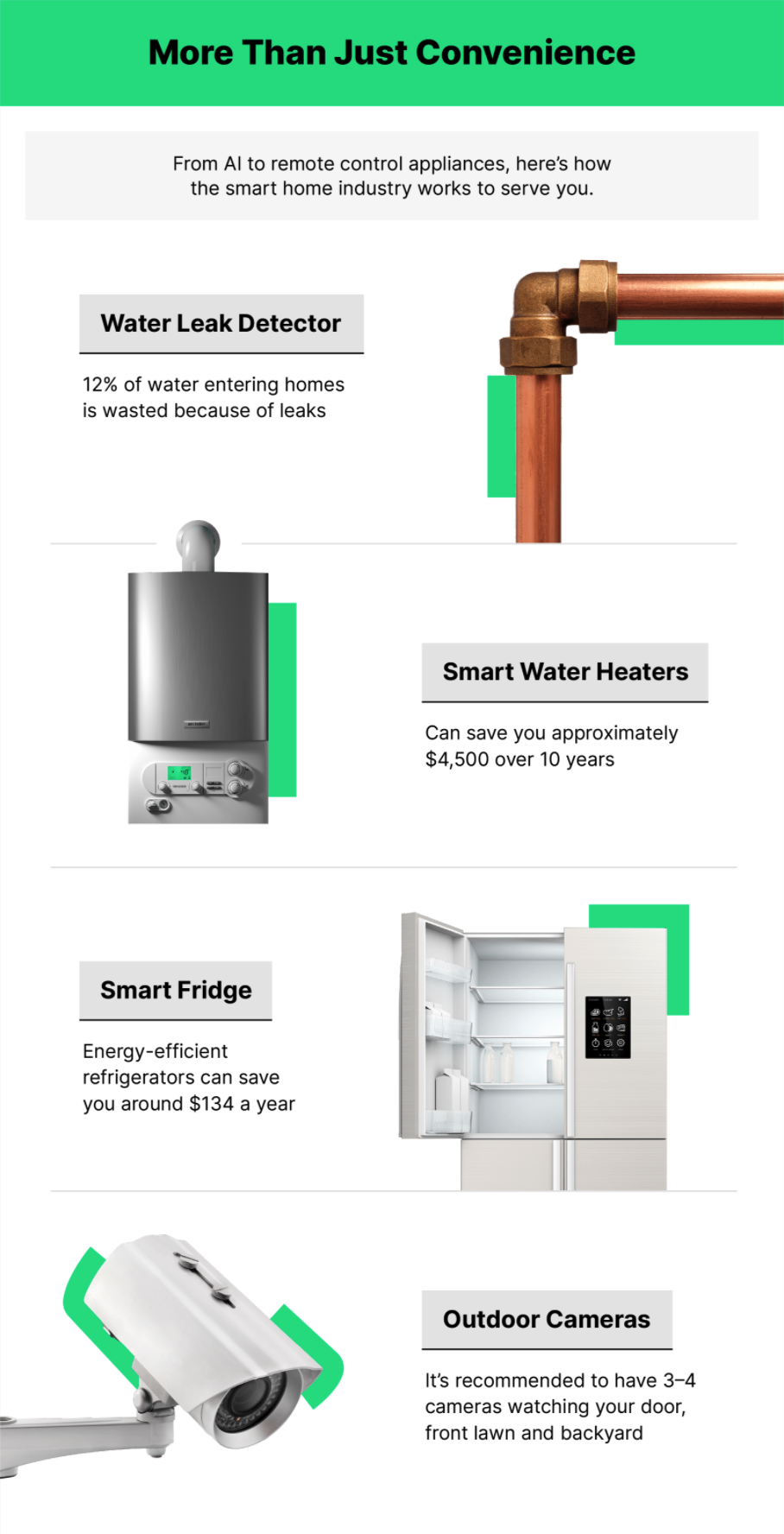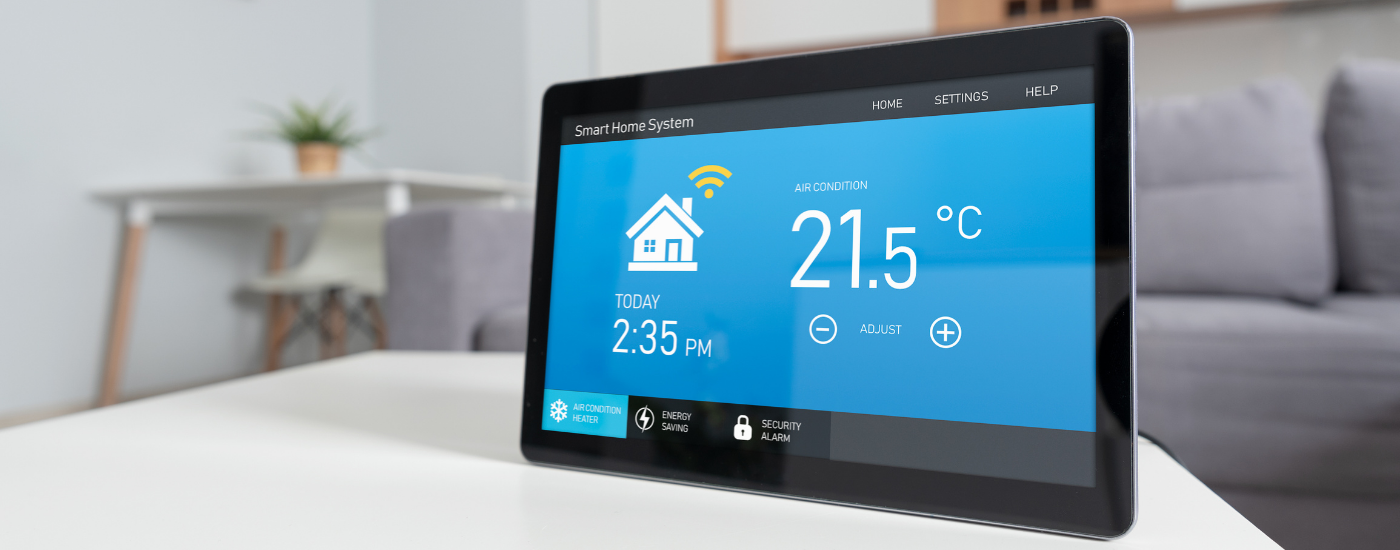Smart home devices are designed to make life easier, whether by automating everyday actions around the house or by giving you control and insight into your home health through a simple app or voice commands.
But what you may not know is that these smart home devices can even save homeowners big money in the long run. Keep reading for the devices we recommend using to optimize your home—including a few that could even help protect it.
A smart investment
The popularity of smart home systems has gone through the roof recently for several reasons. Besides the convenience factor (especially during a pandemic and quarantine), they can also minimize or prevent certain dangers like water damage, theft and fire.
Issues like these can cost thousands of dollars to fix, especially if they aren’t caught early on. In fact, some smart devices are so effective at preventing damage that you could even get a discount on your home insurance premiums just for using them. So it's no surprise that the smart-device market is expected to grow, given the amount of money a smart homeowner could save over time when they take a more modern and proactive approach.

Smart sprinkler and irrigation systems
Today’s smart sprinkler systems are more intelligent than ever. They can keep an eye on the weather forecast to prevent watering the garden when it is raining, or ensure proper moisture levels when you’re going through a dry sell. Some can even determine your soil type and tell you what plants grow best, or give you advice on how to water the plants in your plot.
Leak detectors and shutoff systems
Water-monitoring devices like Flo can alert you about potentially damaging leaks or floods in two ways. Leak detectors can monitor the water pressure in your home and notify you of any sudden drops, which could indicate a leak somewhere. Flood detectors, on the other hand, sit at ground level and alert you when they detect a threatening level of moisture. Some devices can do both, even automatically shutting off the supply if a leak is detected.
A smart refrigerator
Smart refrigerators do more than just look great in your kitchen—they can actually help you prevent food waste and lower your grocery bills. This smart kitchen appliance can warn you when the door is left open, so you won't have to worry about the kids accidentally forgetting to close the door. They also often have mini cameras built in so you can see what's inside from your phone, so that when you're at the store, you don't buy something you already have.
Smart lights
Smart lighting is one of the easiest to install and use of the upgrades to make in 2021, making it the cornerstone of your smart home. No matter which company you go with, all smart lights use LED bulbs, which are far more energy-efficient than older bulbs and produce less heat.
Some smart lights allow you to set the hue, color temperature and brightness. They come in various types, including traditional bulb shapes, strips, rings, plug-ins and wall panels, so you can customize the lighting story of your home.
With features such as timers, motion detectors and geofencing, your smart lights can be programmed to switch off even if you or your family forget, lowering your electricity bill all year long.
Smart plugs
Smart plugs are one of the easiest ways to make your house smart—and save some money in the process. These compact devices use a timer or an app to switch off your regular “dumb” devices and appliances.
With a smart plug, you can make sure that tools like heat guns and hair straighteners are off, even after you’ve already left home. You can also set timers to make sure certain appliances and lights aren't on all night to save energy and money. Alternatively, you can program them to come on occasionally while you’re out of town, deterring any burglars who might not know you’re away!
Smart window coverings
Window treatments aren’t usually the first thing you think of when you think of a smart home device, but these underappreciated devices are more than just a luxury gimmick. Smart window treatments allow you to operate hard-to-reach curtains or blinds easily, and some can even be programmed to respond to the environment automatically, offering savings on temperature control and lighting. The experts at ACEEE estimate that even a small smart window treatment strategy can save you between 11-20% on your heating and cooling bills, plus approximately 3% on your lighting costs, which can equal big bucks month over month.
A smart thermostat
The most obvious money-saving gadget for your smart home is the connected thermostat. These devices can learn how you prefer to heat and cool your home, and then work to save you money. Some have a relatively high initial cost (and installation fee), but they can end up saving you over 20% on your heating and cooling bills for substantial financial savings in the long term.
All-in-one monitoring systems
Interested in a smart home but not sure where to start? Sometimes an all-in-one approach is the best answer, especially for people who may not be as tech-savvy or handy. Modernizing your home electronics can be somewhat overwhelming if you’re not sure which devices would best suit your home’s needs. Should you invest in smart thermostats? Security cameras? What about lighting? If convenience is at the top of your list, followed by safety and energy conservation, then you may want to seriously consider a complete system from a monitored home security provider like ADT for a convenient and cohesive smart home package.
For maximum cost-effectiveness, make sure to check in with your home insurance provider, because you may be eligible for discounts with devices or systems that meet specific requirements. Since day one, Hippo has focused on helping our customers take a proactive approach by offering complimentary smart home devices, because a smarter home is a safer home. Talk to your provider to see what discounts you may be eligible for when you upgrade to a smarter home.




